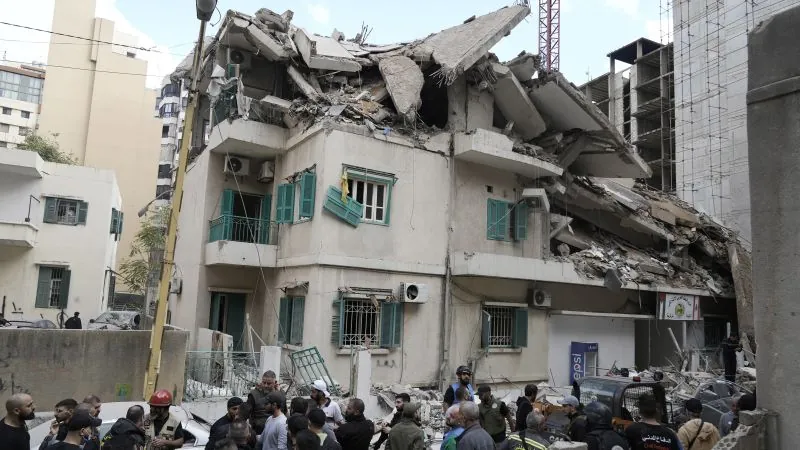
Israeli Airstrike Claims Life of Hezbollah Spokesperson; Tensions Rise Amid Ceasefire Talks
2024-11-17
Author: Yan
Israeli Airstrike Results in Death of Hezbollah Spokesperson
In a significant escalation of the ongoing conflict, an Israeli airstrike in Beirut on Sunday resulted in the death of Hezbollah's spokesperson, Mohammed Afif. The attack, carried out in the bustling neighborhood of Ras al-Nabaa, also left four other individuals dead, as confirmed by Lebanon's health ministry.
Afif, a prominent figure within Hezbollah who had served as an adviser to the late leader Hassan Nasrallah and handled the group’s media relations since 2014, was described by Hezbollah as a 'great media leader.' His death marks a considerable blow to the organization, known for its close ties with Iran and its stance against Israel.
Eyewitness Accounts and IDF Operation
Eyewitness accounts noted that no evacuation warning was given prior to the strike, which happened in broad daylight, catching many off guard. The Israel Defense Forces (IDF) characterized the operation as a 'precise, intelligence-based strike' aimed at eliminating what they termed a 'terrorist leader.'
Reactions from Hamas and Broader Implications
Hamas, a rival yet allied militant group operating in the region, expressed condolences towards Afif's family, honoring his dedication and strength as a voice for resistance. The implications of his death could resonate across the region, affecting both morale within Hezbollah and the broader dynamics of the conflict.
Further Airstrikes and Ongoing Violence
On the same day, an additional airstrike targeted Mar Elias, a densely populated district in northern Beirut, resulting in at least two more fatalities. This marked a continuation of escalating violence, with five strikes recorded within the limits of Beirut since the 2006 Lebanon War, underscoring the fragility of the region's security situation.
Ceasefire Evaluation Amid Hostilities
As tensions simmer, Hezbollah is reportedly evaluating a ceasefire proposal submitted to the Lebanese government by the US and Israel, amidst ongoing hostilities. The impact of Afif's assassination on these negotiations remains uncertain, but it adds another layer of complexity to an already volatile situation.
Wider Impact on Gaza and Civilian Casualties
In a broader context, the violence is not confined to Lebanon. Reports indicate that at least 50 people were killed in airstrikes targeting Beit Lahiya in northern Gaza the same day, as Israeli forces continue their military operations in response to perceived threats from Hamas. Civilian casualties have mounted, with witnesses recounting harrowing scenes of destruction and loss, as families are forced to flee or shelter in unsafe conditions.
IDF's Justification and Civilian Impact
The IDF has emphasized that its operations are aimed at dismantling terrorist capabilities while attempting to minimize civilian harm. However, the reality on the ground tells a more distressing story, as numerous families bear the brunt of the relentless conflict.
Continuation of Military Campaigns
Israel's military campaign has now expanded to deeper incursions into southern Lebanon, marking some of the most significant military engagements since the height of the previous conflicts. With airstrikes ongoing for a sixth consecutive day and warnings issued to civilians residing in areas known for Hezbollah activity, the stakes continue to rise both in Lebanon and Gaza.
International Community's Involvement
In this climactic phase of the conflict, the international community watches closely, hoping that diplomatic efforts may pave the way for peace. However, with strategic priorities deeply entrenched within militant factions and state actors, the journey toward resolution seems fraught with challenges. As Hezbollah weighs its next steps, the potential for further bloodshed looms large, raising urgent questions about stability in the region and the prospects for a lasting ceasefire.


 Brasil (PT)
Brasil (PT)
 Canada (EN)
Canada (EN)
 Chile (ES)
Chile (ES)
 España (ES)
España (ES)
 France (FR)
France (FR)
 Hong Kong (EN)
Hong Kong (EN)
 Italia (IT)
Italia (IT)
 日本 (JA)
日本 (JA)
 Magyarország (HU)
Magyarország (HU)
 Norge (NO)
Norge (NO)
 Polska (PL)
Polska (PL)
 Schweiz (DE)
Schweiz (DE)
 Singapore (EN)
Singapore (EN)
 Sverige (SV)
Sverige (SV)
 Suomi (FI)
Suomi (FI)
 Türkiye (TR)
Türkiye (TR)